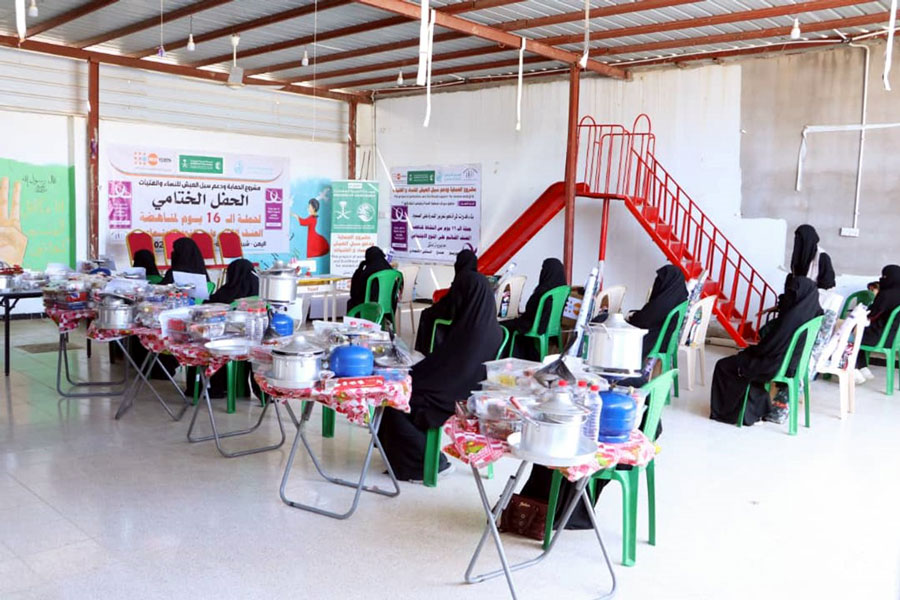
In partnership with the United Nations Population Fund (UNFPA) and King Salman Humanitarian Aid and Relief Center (KSrelief), HUMAN ACCESS in the governorates of Al-Mahra, Shabwa and Marib performed a wide range of important activities to advance women and empower them economically to cope with harsh conditions, within the protection and livelihood support project “Safe Space for Women and Girls.”
In Al-Mahra, and under the auspices of the Governor of the Governorate, Mohammad Ali Yaser, the safe space in Al-Ghaydah city granted economic empowerment toolkits to 26 beneficiaries, in the presence of the First Undersecretary of the Governorate, Dr. Mukhtar Al-Jaafari, the Assistant Director of KSrelief Center, Ali Bakhit Al-Mutairi, and the Deputy Director-General of the Social Affairs & Labor office, Salem Suweilem.
In his remarks at the handover ceremony, Undersecretary Al-Jaafari commended the efforts of HUMAN ACCESS, UNFPA, and KSrelief for executing these significant humanitarian projects and assisting the most vulnerable and needy families in acquiring craft professions that qualify them to gain employment and earn a living, despite the difficult economic and living conditions.
The safe space in Al-Ghaydah also organized a bazaar to display and market the products of women beneficiaries of vocational rehabilitation and economic empowerment projects, in the presence of the Assistant Undersecretary for Women’s Affairs Khadija Bakrit, the Governor’s Advisor for Women’s Affairs Alia Al-Harizi, and the Relief Coordinator at KSrelief office branch in Al-Mahra, Salem Al-Saqqaf, and others.
Several corners were set up in the bazaar, including a mobile phone repair corner, a hairdresser's corner, a henna engraving corner, a pastry shop, and an embroidery corner.
In her speech at the bazaar's opening, Bakrit complimented the organization of the bazaar, the protection and livelihood support project, and the tangible efforts being made to improve women's status and ensure their participation in economic and social development as a whole.
During the 16 Days of Activism campaign to combat gender-based violence, Shabwa's safe space gave out economic empowerment grants for the fourth quarter of this year as part of its mission to combat gender-based violence. Eleven women received empowerment grants, five of them sewing and tailoring, and six in the manufacture of incense and perfumes, to combat poverty and unemployment.
The safe space in Ataq ended the 16-day campaign with a closing ceremony under the slogan, “What is your role to protect women and provide for their needs?”
The closing ceremony involved a group of meaningful events, such as honoring the Community Protection Network in appreciation of its wonderful role in supporting the campaign against the epidemic of anti-women violence.
In Marib, the safe space in Al-Wadi district organized a two-day bazaar to display and market the products of women beneficiaries of economic empowerment projects during the current year.
Several corners were established at the bazaar to highlight the creativity of the beneficiaries and introduce their products. These included sewing, perfumes, and handicrafts.
In Al-Matar area, the safe space organized a community awareness campaign and a group psychological support session on the importance of girls' education in decreasing gender-based violence and promoting psychological resilience.
In this series of research-based and ongoing activities, Yemeni women can strengthen their steadfastness and overcome the obstacles to obtaining their legitimate rights.
Related articles
- On the occasion of the 16-day campaign.. a series of events to introduce violence against women
- Recreational activity for children, vocational training for women, and meetings for peer networks and community committees
- Promoting women's participation in society and alleviating their difficulties
- Concrete solutions to ensure the safety and dignity of women and girls
- Securing decent job opportunities for women most in need
- 16-Day Campaign to Combat Violence Against Women Continues


